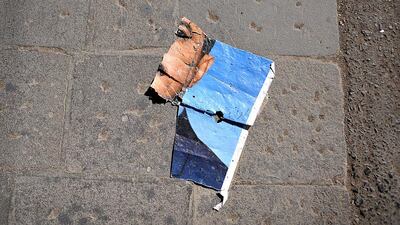Over the weekend, Yemen’s former president Ali Abdullah Saleh – whose whereabouts are unknown – took to social media to tell the world what has been evident to anyone who has followed his decades in power: he wasn’t going anywhere.
Responding to reports that he had sought safe passage out of Yemen (and been rebuffed by Saudi Arabia), he struck a defiant tone: “I’m not the type who goes looking for a place to live in Jeddah, Paris or Europe. My country is my birthplace. The person who can say to Ali Abdullah Saleh ‘leave your country’ has not been and will not be born,” he wrote.
Mr Saleh has a short memory. Unfortunately for him, millions have been born who have told Mr Saleh to leave: that’s why millions of Yemenis took to the streets four years ago chanting the Arabic word for leave, “Irhal”. It’s why the families of many of those protesters must still mourn them, because it was Mr Saleh’s military that shot and killed them for expressing an opinion other than his.
And indeed, Mr Saleh was told to leave by other Arab leaders, which is why the GCC formulated a transition plan to get him out of the president’s chair.
It now seems clear that allowing Mr Saleh to remain in Yemen during the transition, though it was a concession at the time that allowed the transition to happen, was a mistake. Because deal or no deal, promises or not, regardless of what Mr Saleh has said in public, he has never stopped craving the presidency of Yemen for someone with the surname Saleh.
Go back to the start of protests in 2011. Mr Saleh, having seen the protests sweep across North Africa and unseat Zine Al Abidine Ben Ali in Tunisia, gave public assurances that he would not stand for another term, that there would be no “inheritance” of the presidency by his son, and that, as he put it, “the clock would not be turned back”.
But that is precisely what Mr Saleh has plotted for years. Even as the Houthis were marching south from Sanaa, and sending fighter jets (piloted by Saleh loyalists) to bomb Mr Hadi’s residence, rumours swirled that only Mr Saleh’s son could stabilise the country again.
As for turning back the clock, there is no clearer indication of what Mr Saleh intended than his support for the Houthis in destabilising the transition of Mr Hadi.
For Mr Saleh, the clock stopped on February 25, 2012, the day he formally handed power to his deputy Mr Hadi – and he will stop at nothing to restart it from that date.
The essence of the problem is this: Mr Saleh does not crave power because he believes Mr Hadi’s transition will be bad for Yemen. He is not supporting the Houthis because he believes they ought to have a stake in Yemen’s political make-up. His supporters in the army are not manning checkpoints in Sanaa or firing mortars against civilians in Aden because they genuinely believe there is outside aggression against Yemen. All of these things are being done for one reason alone. Mr Saleh believes Yemen belongs to him and him alone, and will not allow anyone to take it from him.
If that sounds familiar it is because it is both the sentiment and the guiding policy of every one of the Arab Spring leaders. Each one wanted to go on ruling the country for ever; if they could not accomplish that, they wished to pass it on to a designated heir, usually their sons. Without the Arab Spring, Gamal Mubarak, Saif Al Islam Qaddafi and Ahmed Ali Saleh would all, in time, have inherited the presidencies of their countries. Only one of them still believes he can.
By sowing chaos, Mr Saleh believes he can mobilise enough support for a “strongman” to return to Sanaa. As the man most responsible for setting fire to the country and then pouring fuel on the fire, he hopes to one day emerge as the only one who can contain the blaze.
But that would be dangerous. Not merely because Yemen hardly needs another strongman after 30 years of Mr Saleh, but because it should be clear that anyone who was president merely to contain chaos would have a very strong interest in perpetuating that chaos to remain in power. That was basically Mr Saleh’s playbook for three decades: keep Yemen’s various groups fighting, keep dancing on the heads of snakes, and stay in power.
Mr Saleh remains – as one Arab columnist wrote – like the many posters of him that hang in Sanaa, faded but still stuck to the walls. His political manifesto for the country may not be as blunt as that of Syria’s Bashar Al Assad – whose shabiha thugs frequently daub the slogan “Assad, or we burn the country” – but the end result is the same.
Yemen needs better than managed chaos. It needs genuine stability and real progress. As long as Ali Abdullah Saleh wields influence in his country, that cannot happen.
falyafai@thenational.ae
On Twitter: @FaisalAlYafai


